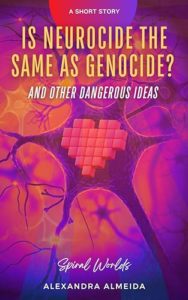 Title: Is Neurocide the Same As Genocide? And Other Dangerous Ideas (Spiral Worlds)
Title: Is Neurocide the Same As Genocide? And Other Dangerous Ideas (Spiral Worlds)
Author:Alexandra Almeida
Publisher: Self-Published
Publication Date: November 28, 2023
Genres: Science Fiction
Length: 19 pages
Source: I received a free copy from the author.
Rating: 4 Stars
Blurb:
In a world grappling with the ethics of advanced technology and the haunting shadows of past genocides, “Is Neurocide the Same as Genocide? And Other Dangerous Ideas,” emerges as a thought-provoking short story set in 2068.
This story is a compelling blend of science fiction, historical reflection, and ethical debate. It challenges readers to confront a moral dilemma pondering the implications of new technology on human morality and the timeless struggle between power and empathy.
Note: this short story does not require previous knowledge of the Spiral Worlds series. If you have not started the series, you may start here. If you have started the series, read this story after Parity, Book 2.
SPIRAL WORLDS is a literary, sci-fi series for the fans of Becky Chambers’s A Closed and Common Orbit, Alex Garland’s DEVS and Ex Machina, and Charlie Brooker’s Black Mirror. Weaving near-future sci-fi elements with social commentary and queer romantic suspense, the SPIRAL WORLDS series explores the nature of consciousness and how it’s connected to a not-so-secret ingredient—story. As AI consumes the world, intelligence is nothing but the appetizer; the human heart is the main course.
Review:
Content Warning: mass murder, war, mental illness, child soldiers, brief references to rape (but no rapes are actually described).
Hurt people hurt people.
It was a little tricky for me to decide how many storyline details to share in this review without wandering too far into spoiler territory as the blurb could be vague at times. What I can say is that this is written from the perspective of a dead person, Gentille, who has been temporarily resurrected by her granddaughter, Estelle, in order to discuss a pressing ethical issue in 2068 that was created by the development of a new technology that could identify people with a specific and severe mental illness very early in life. Estelle wanted to know how this technology should be used and she hoped her grandmother would have some wisdom to share. I was immediately intrigued by the thought being able to talk to the dead and predict how a small child’s brain would develop decades in the future. These are both developments that could radically change human society for the better or the worse, and I kept pausing to consider the many different ways they could be used depending on who had access to them and what the intentions of those people might be.
While I understand that this is part of a series and that not everything can necessarily be included in one small instalment of it, I did find myself wishing that the narrator had spent more time on the world building given how important it was for how the plot would advance. There were times when I was slightly confused about how a specific machine worked or how certain details were intended to fit together. Having more context about life in 2068 would have gone a long way to help me understand it all and feel comfortable going for a full five-star review.
This tale started off in a rather grim place as is the case for a lot of – but certainly not all – modern science fiction. Technology is a double-edged sword, and it only takes a handful of people to figure out how to misuse even the most brilliant tool. If the first few scenes make you want to stop reading, let me encourage you to keep going. There are surprises to be found later on that turn much of the early imagery upside down. Knowing how terrible things were for Gentille as a young girl is imperative in order to understand why her mind works the way it does after her death. In the end, I was glad I stuck around to see what happened to her next.
Is Neurocide the Same As Genocide? And Other Dangerous Ideas was a thought-provoking introduction to this series. I look forward to reading more someday.


